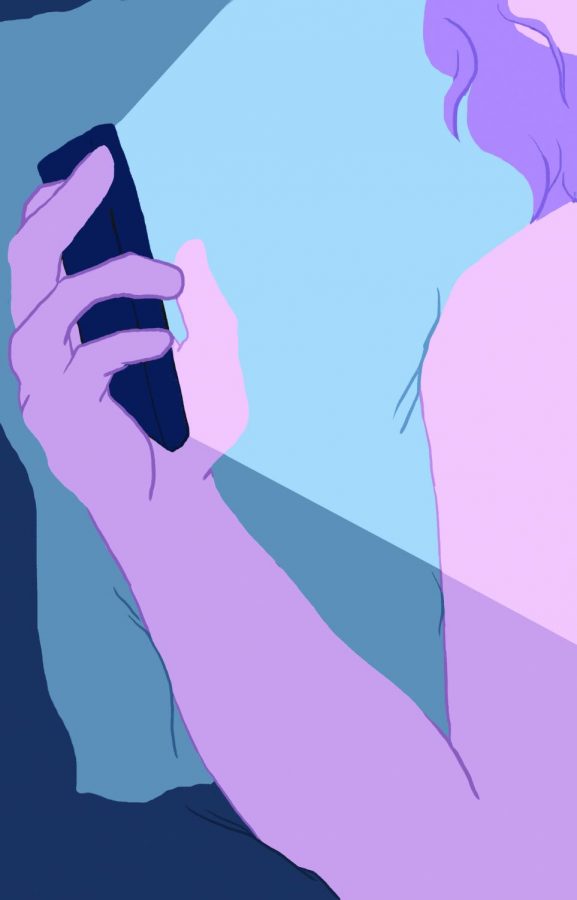Temptation overrides questionable textiquette
Temptation overrides questionable textiquette
April 13, 2015
Chimes sound at a wedding, bells ring at a funeral. But these are not the celebratory or somber sounds fit for such momentous or weighty events—they are the signaling tones of mobile phones. A hush sweeps over the crowd, and the guilty party attempts to silence the interruption as swiftly and anonymously as possible.
While social norms have, to some extent, bent and yielded to the new etiquette that smartphone technology has cut and pasted into today’s culture, research shows many people still consider the text messaging habits of young individuals in particular to be compulsive or rude.
In a Feb. 19 study published in The Social Science Journal, 152 college students responded to surveys regarding their cellphone use. While situations such as job interviews, religious services, saying the Pledge of Allegiance, being on a date or having sex were rated as socially unacceptable times to send or receive a text message, surveyed students admitted that their acknowledgment of this would not stop them from doing so.
“Our student participants think it’s really not the right thing to do, but they’re going to do it anyway,” said Marissa Harrison, lead author of the paper and associate professor of psychology at Penn State Harrisburg. “Norms may not have changed, but the willingness to breach them has. I don’t know if that’s because of, or facilitated by, cellphone use or just indicative of a new generation.”
Nearly one-third of the students said they send and receive about 100 text messages per day and, on average, check their phones every three to four minutes, according to the study, regardless of whether they received a notification of some kind. Nearly 80 percent of participants said they would even respond to or send a text message while having a face-to-face interaction with a friend or acquaintance.
“Let’s say I’m talking to someone in the hallway and I’ve had some time to habituate to them,” Harrison said. “I know they’re not dangerous, they’re familiar to me, then I get this changing, flashing potential for communication immediacy in my hand and it just seems overwhelming to ignore. Maybe I could habituate to the person that is speaking to me, but I can’t do so with this ever-changing stimulus.”
However, Harrison said the sometimes-compulsive need to respond to a text or social media notification, even at the risk of being perceived as rude or breaching unspoken social contracts might have an evolutionary origin rather than being chalked up to impatience or lack of willpower.
“Obviously, cellphones did not exist in our ancestral environment,” Harrison said. “But we evolved to pay careful attention to moving, changing, flashing things because this might signal danger. Even babies prefer to look at moving things, so my thought was with an ever-changing tiny cellphone screen, with flashes and beeps and ring tones that accompany text messaging, and each text message itself being novel, I don’t think we can help but pay attention to it.”
This innate mechanism in the human mind to pay attention to small, attention-grabbing changes in the environment is apparent in the way people adapt their behavior to the social standards, particularly since the advent of smartphones, according to Abu Sadat Nurullah, a Ph.D. student in the department of Sociology of Health & Well-being at the University of Alberta in Canada.
“More and more people are making it habitual to use cellphones in all places, be it a classroom or in a public space, when they’re having dinner and whatnot,” Nurullah said. “It’s affecting our lives in most circumstances. If someone is alone, let’s say, in most cases they would look at their cellphone every couple of seconds to see if something new is happening.”
In his 2009 paper, “The Cell Phone as an Agent of Social Change,” Nurullah cites the kind of techno-social availability that smartphones give users as one of the driving forces behind the cultural shift in social norms and etiquette people are experiencing.
“Right now my research focuses on cellphone use and driving,” Nurullah said. “People are aware of the risks involved when they talk or text, but their perception of bad things happening to them is low, while the perception of bad things happening to others is high. It’s a sort of cognitive dissonance that people have. They manage to rationalize texting while driving because of this expectation of being available all of the time.”
John D’Acunto, a junior interactive arts & media major, said despite using his phone throughout the day, he is able to exercise restraint in terms of the temptation to immediately respond to messages.
“I don’t text in class and I probably wouldn’t text at an inappropriate time unless it was a really important message,” D’Acunto said. “I’ll text around my roommates or my good friends, but if I’m having a conversation with someone, I’ll ignore it for the time being.”
For D’Acunto, there are advantages and disadvantages to the ubiquity of smartphones. He said the accessibility they provide is important, but cell phone fixation can be unhealthy.
“I use the phone to stay in touch with all of my family and friends from home,” D’Acunto said. “But it’s important to know when you should or shouldn’t be using it. People tend to be constantly on their phones rather than just being social by talking to someone face to face.”








